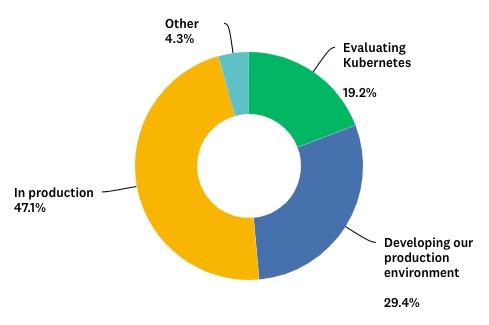
Despite its seemingly large presence, Kubernetes may not be as widely adopted as it seems.
Platform9 conducted a survey at KubeCon EU in Barcelona this month, speaking with over 500 attendees. Through the survey, the company said it was able to understand how companies are currently using Kubernetes.
The survey revealed that despite the fact that all of the people surveyed were attending a Kubernetes conference, only half (47.1 percent) of them were currently using Kubernetes in production. Nineteen percent were evaluating it, and 29 percent were currently developing a production environment for Kubernetes.
RELATED CONTENT:
How the lack of Kubernetes experts is hindering adoption
Platform9 releases three new open-source tools for Kubernetes
“These early adopters organizations are spearheading the digital transformation revolution and many, many mainstream enterprises will follow in their footsteps and see success with Kubernetes in production in the very near future,” Platform9 wrote in a post.
Half of the respondents cited operational complexity as the biggest barrier to Kubernetes adoption. “While it may be relatively easy to deploy Kubernetes initially for experimentation and Proof of Concepts, operating it at scale, monitoring and alerting, maintaining high availability, and achieving non-disruptive upgrades is enormously challenging,” Platform9 wrote.
Another forty percent stated that they were struggling with migrating legacy applications to Kubernetes.
In the next 12 months, most of the respondents are looking to deploy Kubernetes on-premises (59.08%). For those looking to deploy in cloud, 51.41 percent are looking to AWS, 24.81 percent to Microsoft Azure, 29.41 percent to Google Cloud Platform, and 13.04 percent were planning to deploy on another hosting provider.
Finally, Platform9 found that CI/CD automation and containerization of legacy apps were the top use cases for Kuberentes.








